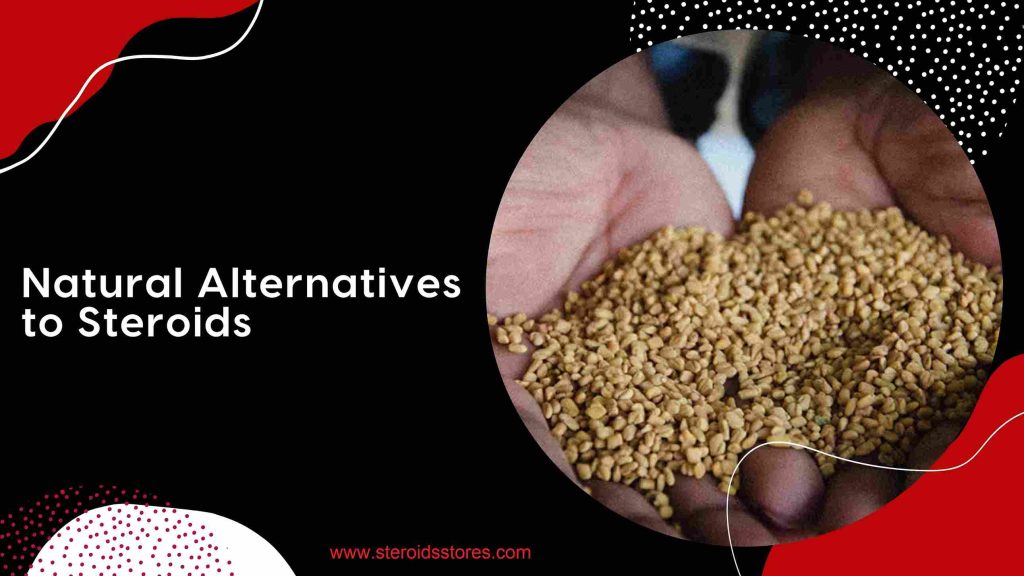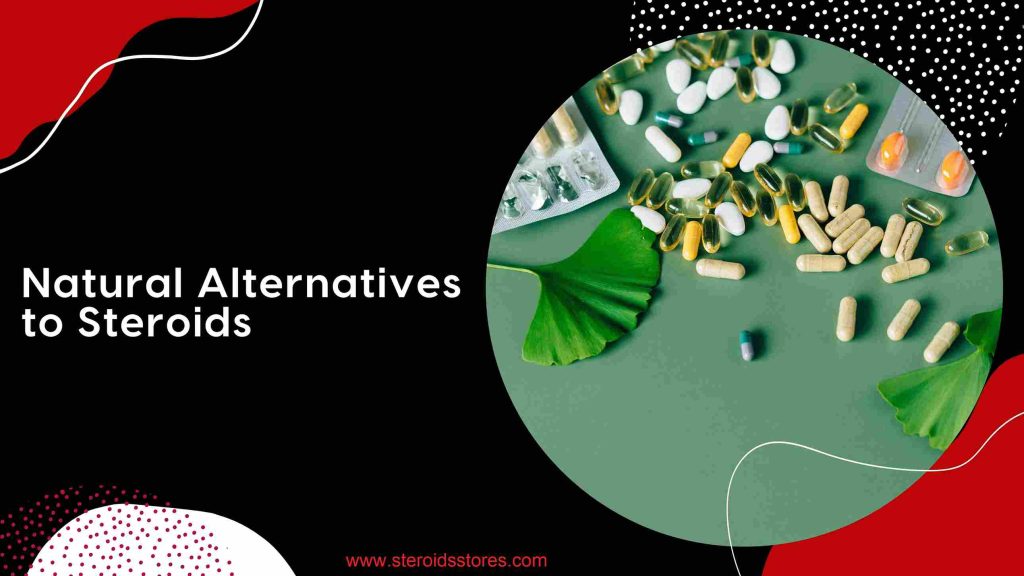Bodybuilders
Natural Alternatives to Steroids: Build Muscle Safely and Legally
Natural Alternatives to Steroids, building muscle and reaching your fitness goals doesn’t have to come with the risks associated with anabolic steroids. There are many natural and legal alternatives that can help you increase strength, improve performance, and optimize recovery, all while protecting your long-term health. We explore effective supplements, as well as the essential role of diet, training, and recovery in muscle growth.
Legal steroids, also known as multi-ingredient pre-workout supplements (MIPS)Trusted Source, are over-the-counter (OTC) supplements. They are designed to aid in bodybuilding and improve performance and endurance during training.
What are Natural Steroids?
The body naturally produces steroids, such as the hormone testosterone, to build muscle tissue and perform other important bodily processes.
Natural steroids generally refer to compounds found in plants, herbs, and other natural sources that mimic human hormones and steroids.
Advocates of natural steroids argue that they work in the body like anabolic steroids. These are compounds that build and repair muscle by increasing testosterone production.
Natural steroids may also be called legal steroids, and companies often sell them as a blend of ingredients.
Natural Alternatives to Steroids
- Creatine
Creatine is an amino acid found in foods that has similar effects to steroids. Some studies have shown that using creatine for 5-7 days can significantly improve the following:
- Strength
- Power
- Work involving several sets of muscle contractions at maximum effort
- Sprinting and football performance
- Matrix Metalloproteinase (MMP)
MMP is a blend of creatine, betaine, and dendrobium extract, often sold under the name Craze or other names.
This supplement is relatively safe to use. However, it does not contain the muscle-building claims that the drug’s promotional text might lead you to believe.
In a 2014 study, found that participants who used it during a 6-week training period reported increased energy and improved concentration, but no increase in body mass or overall performance.
As with other over-the-counter supplements, beware of additional ingredients that may cause allergic reactions or long-term negative health effects.
- Dimethylamylamine (DMAA)
DMAA has been found in many muscle-building and weight-loss supplements, but it is not safe. Any product that contains it and claims to be a dietary supplement is illegal.
The Food and Drug Administration (FDA) has issued several warnings to consumers to avoid DMAA and its various forms in over-the-counter supplements.
DMAA use may cause one or more of the following complications:
- Narrowing of blood vessels
- Increased blood pressure
- Shortness of breath
- Feeling of tightness in the chest
- Irregular heartbeat
- Tribulus Terrestris
Compounds in Tribulus terrestris, called steroid saponins, may weakly mimic the effects of testosterone and related hormones. It may improve muscle function and testosterone levels.
However, a 2020 study concluded that scientists need to conduct more research to determine whether Tribulus terrestris is safe and has a therapeutic effect.
- DAA
Limited research suggests that D-aspartic acid (DAA) may play a role in the production and release of testosterone.
However, most of these studies showing that DAA increases testosterone levels have been conducted in animals. More human studies are needed to support their conclusions.
- Branched Chain Amino Acids (BCAAs)
BCAAs consist of three essential amino acids: leucine, isoleucine, and valine. They play an important role in muscle protein synthesis.
They help reduce muscle soreness, minimize muscle breakdown, and improve recovery.
BCAAs are especially useful during intense workouts or periods of calorie restriction.
- Beta-alanine
Beta-alanine is an amino acid that improves muscle endurance by reducing the build-up of acid in the muscles during exercise.
It can delay fatigue, allowing for longer, more effective workouts.
This supplement is especially useful for high-intensity workouts and resistance training.
- Protein Powder
Protein is essential for muscle repair and growth. Supplements such as whey protein are a convenient and effective way to meet your daily protein needs.
Taking protein after training helps kick-start muscle recovery and improve muscle synthesis.
- Ginseng
Some studies have shown that ginseng may help prevent certain diseases, such as diabetes or aging, that trigger muscle loss.
A 2017 study found that treating muscle cells with black ginseng extract promoted muscle-specific gene expression and cell differentiation. This caused muscle cells to become larger, wider, and thicker, improving cell activity.
- Fenugreek
Researchers need to learn more about this herb.

A study in male mice showed that fenugreek extract increased endurance and the use of fatty acids during exercise. Research also suggests that fenugreek may have fat-reducing properties.
Compounds in fenugreek extract may increase testosterone levels by preventing the body from converting it into other sex hormones.
- Safed Musli
Safed Musli is a herb used in traditional Indian medicine to treat sexual dysfunction in men, believed to do so by increasing testosterone levels.
More studies on Safed Musli are needed to see if it can also improve muscle mass, repair, endurance, or strength.
- Ashwagandha
Withania somnifera, or Ashwagandha, is an herb used in Ayurvedic medicine for rejuvenation, vitality and longevity.
A 2018 study gave healthy men a daily dose of 500 milligrams (mg) of ashwagandha for 12 weeks, while the participants performed progressive overload resistance training 4 days a week.
Subjects who took ashwagandha reported greater improvements in upper- and lower-body strength, as well as a favorable distribution of body mass, compared to those in the placebo group.
The Role of Diet, Training, and Recovery in Muscle Growth
Building muscle mass naturally takes more than just intense workouts; it’s a combination of proper nutrition, effective training, and adequate recovery. Each of these factors plays a critical role in supporting muscle growth and overall progress.
1. Diet: Nourish Your Muscles
To build muscle mass, your body needs the right nutrients in the right amounts.
- Protein: Protein is essential for the repair and growth of muscle fibers. Include lean sources like chicken, fish, eggs, tofu, and legumes. Aim for at least 1.4-2.0 grams of protein per kilogram of body weight per day.
- Carbohydrates: Carbohydrates provide the energy needed for hard workouts. Complex carbs like oats, sweet potatoes, and brown rice are great for long-lasting energy.
- Healthy Fats: Fats help produce hormones, including testosterone, which is essential for muscle growth. Include sources like avocados, nuts, seeds, and olive oil.
- Hydration: Water helps transport nutrients to your muscles and keep your body functioning properly.
2. Training: Promote Muscle Growth
To grow muscles efficiently, your training routine must stress your muscles.
- Progressive overload: Continuously stress your muscles by gradually increasing the weight, intensity, or volume of your workouts.
- Compound movements: Prioritize exercises like squats, deadlifts, and bench presses that engage multiple muscle groups simultaneously.
- Consistency: For balanced growth, stick to a consistent training routine and train each muscle group at least 2-3 times a week.
- Rest between sets: When training for hypertrophy, take 60-90 seconds of rest to maximize muscle development.
3. Recovery: Help to Muscle Growth and Repair
Recovery is just as important as nutrition and training. Without it, muscles cannot repair or grow effectively.
- Sleep: Aim for 7-9 hours of quality sleep each night. This is when your body repairs muscle tissue and releases growth hormones.
- Rest days: Plan 1-2 rest days per week to give time to your body to recover and avoid overtraining.
- Active recovery: Doing light exercise like walking, yoga, or stretching on your rest days can improve blood circulation and reduce muscle soreness.
- Stress management: High stress can increase cortisol levels, which can hinder muscle growth. Practice relaxation techniques such as meditation and deep breathing.
Summary
Many products claim to contain so-called natural steroids, that is, naturally occurring compounds that act like human steroids such as testosterone.
However, no natural products other than creatine have been approved for human use outside of treating menopausal symptoms, despite some preliminary studies.
The FDA does not consider most dietary supplements or products safe, as they are poorly regulated and tend to contain unlisted and illegal ingredients.
People taking dietary supplements should consult a doctor if they experience any of the following symptoms:
- Nausea
- Fatigue
- Weakness
- Fever
- Abdominal or chest pain
- Shortness of breath
- Brown or discolored urine
- Jaundice, the yellowing of the skin or whites of the eyes
If you are interested in natural steroids, the safest option is to consult a doctor before taking supplements.

